In an exclusive interview with Breitbart News on Thursday, former commander of British forces in Afghanistan Colonel Richard Kemp blasted President Biden’s exit from Afghanistan, claiming it was worse than 9/11 and calling it “the greatest victory for jihadists” and “a blow for American prestige” which won’t recover for decades.
Kemp also warned of new threats in the wake of unfolding events there, including another refugee crisis and emboldened adversaries such as Iran, Russia, and China.
The former commander who led British forces in Afghanistan in 2003 and later joined the committee supervising the country’s intelligence services, began by describing the unfolding events in Afghanistan as “the greatest foreign affairs and military catastrophe since the Second World War, without a doubt.”
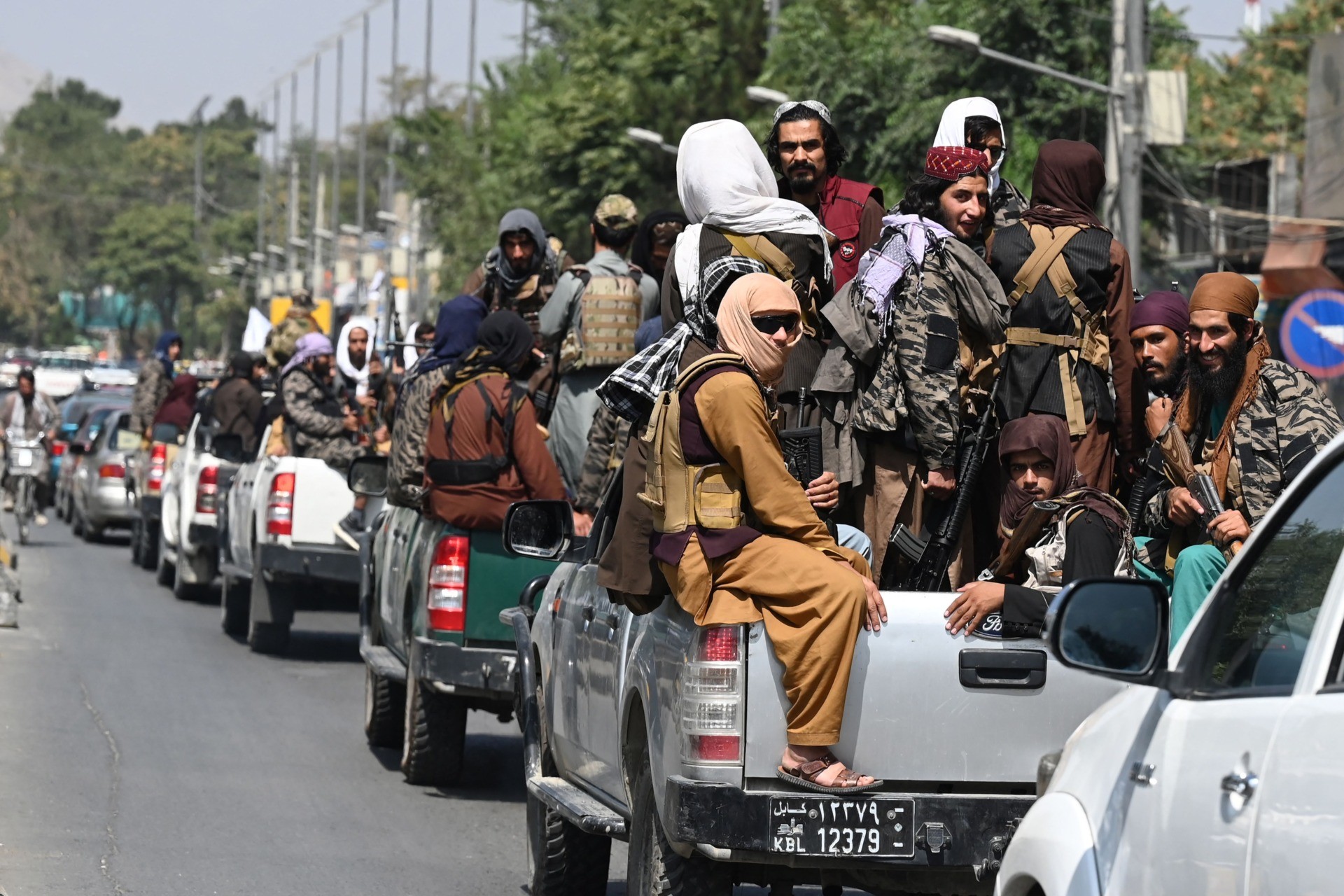
A convoy of Taliban fighters patrol along a street in Kabul on September 2, 2021. (AAMIR QURESHI/AFP via Getty Images).
“If you combine the Vietnam fiasco and Suez [Crisis] for the British, it’s worse than the two of those combined in its magnitude and its implications,” he stated.
He also described recent events there in light of the Biden administration’s chaotic exit as worse than the 2001 September 11 attacks — the deadliest terrorist attacks on U.S. soil.
“It’s certainly worse than 9/11 which was maybe the result of intelligence failure and possibly could have been prevented,” he said, adding that they were “surprise” attacks, “whereas this is a self-inflicted wound.”
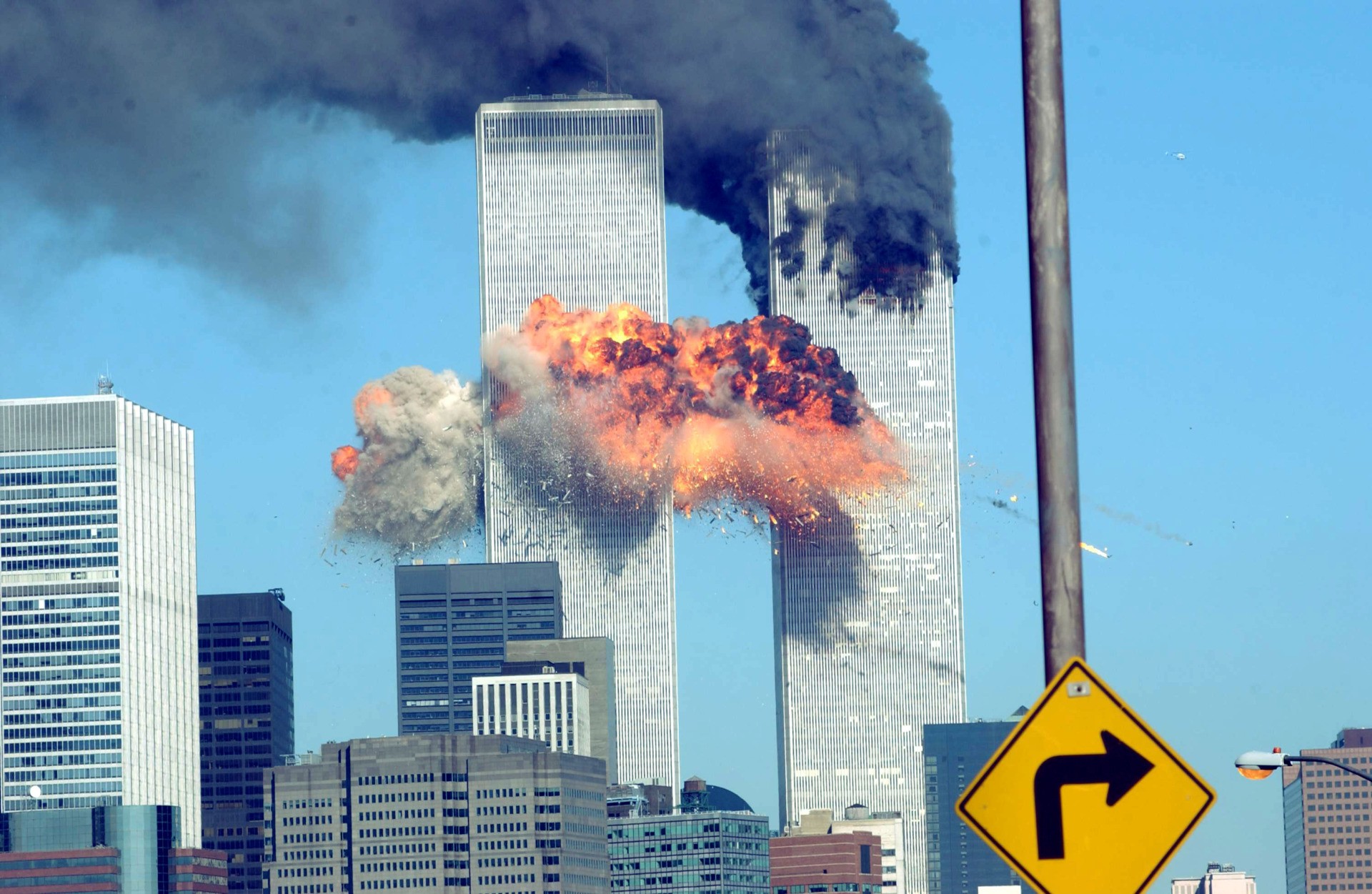
A fiery blasts rocks the World Trade Center after being hit by two planes September 11, 2001 in New York City. (Spencer Platt/Getty Images).
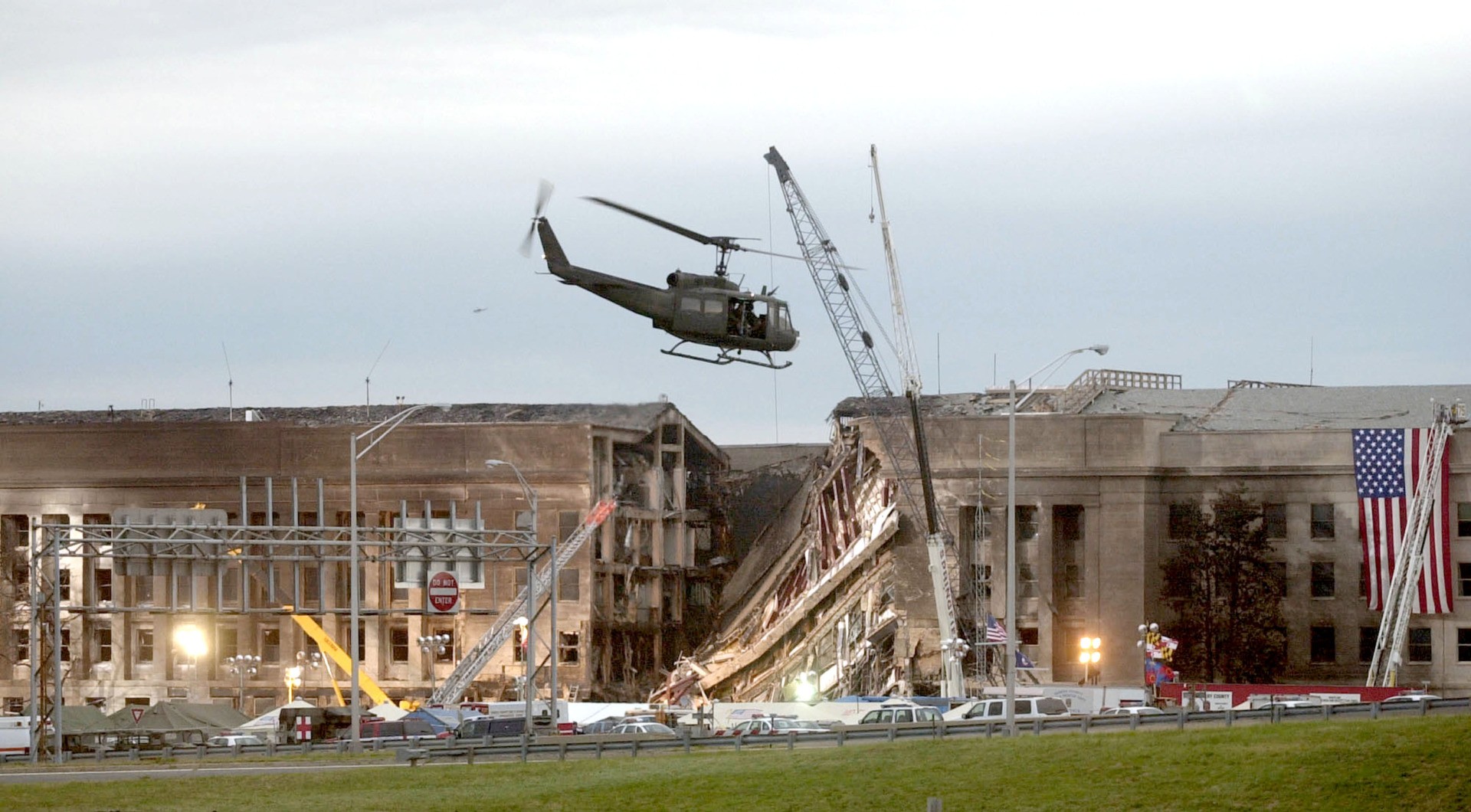
A military helicopter flies in front of the Pentagon September 14, 2001 in Arlington, Virginia at the impact site where a hijacked airliner crashed into the building. (Stephen J. Boitano/Getty Images).
Calling it a “result of a deliberate policy decision” by the U.S. president “against the advice of his generals,” Kemp described the “complete disaster” of a withdrawal as “completely avoidable.”
“It basically ceded a huge amount of authority and power and influence in the world from the West to the authoritarian states of Iran and North Korea, but particularly China and Russia,” he said.
He also accused the Biden administration of having “undermined the efforts that have been recently discussed in Britain, America and the G7, and elsewhere about trying to work to persuade or entice those countries… considering coming into the sphere of influence of China and Russia.”
“It’s basically prevented that from happening really because these countries that we wanted to encourage to join our sphere of influence are going to be asking why they would do that when the U.S., and the West more widely, is a fair-weather ally,” he said.
“When it gets difficult, they get out,” he added, “and Russia and China will be more reliable friends.”
He also claimed that the recent U.S. actions “will certainly inspire Russia and China to push harder against us, knowing that they will not be met with much resistance.”
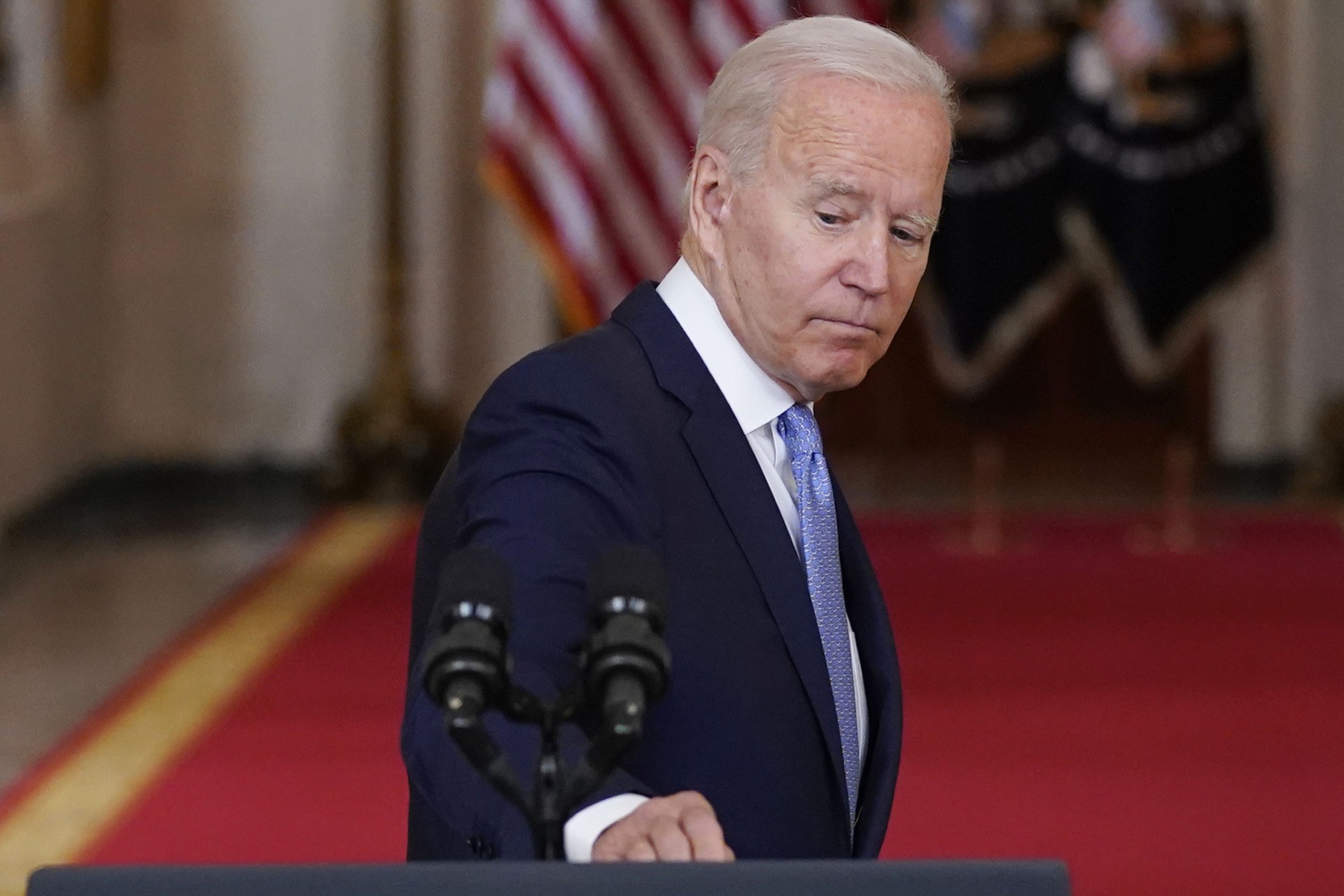
President Joe Biden turns to leave the podium after speaking about the end of the war in Afghanistan from the State Dining Room of the White House. (AP Photo/Evan Vucci).
“They already thought the West was weak, and now they think it’s weaker than originally thought,” he said.
“Basically it’s a real blow for American prestige which will not be recovered from probably for decades,” he added.
Impact on foreign relations
When asked about the impact of recent events on the historic special relationship between the U.S. and the U.K., Kemp described recent talk of a less-than-dependable America.
“I’ve heard talk among some politicians here and political leaders and military people that they need to be looking at being less reliant on the U.S. and on the relationship between the U.K. and the U.S.,” he said, calling it a “terrible situation” to be in.
Claiming to have “never heard this sort of talk before,” Kemp explained the importance of maintaining such relationships.
“I do believe that the U.S.-U.K. relationship is vital for both of our countries, particularly for the U.K., but also very important for the world, because together the U.K. and the U.S. — the U.S. particularly, but the U.K. as a trustee, a trusted ally willing to stand beside the U.S. in pretty much every circumstance — are effectively the leaders of the Western world,” he said.
“So we cannot afford to have that relationship undermined, particularly in the face of increased challenge from Russia and China,” he added.
He also expressed similar considerations with regard to the North Atlantic Treaty Organization [NATO] as a whole.
“NATO has been shown to be effectively a paper tiger as a result of [the U.S. withdrawal] and it’s illustrated by the fact that our defense secretary [Ben Wallace] claims to have attempted to form a British-led coalition without the Americans to remain in Afghanistan,” he said, “and he didn’t get one country to agree to that.”
Kemp claimed that such incidents prove that “NATO without America is nothing.”
“NATO really is America and the rest of it is not much more than window dressing,” he said.
“I think that needs to be very quickly repaired,” he continued. “Not only the image of an impotent NATO but also the reality of an impotent NATO.”
“Each of the NATO members, including the USA, will suffer from the fragmentation of NATO if that’s what happens, so it must be avoided at all costs,” he added.
Terrorism and the Taliban
When asked about a potential rise in worldwide terror threat levels in response to the recent U.S. pullout from Afghanistan, Kemp claimed they had already risen.
“It’s certainly gone up,” he said. “It’s probably at the highest level since before 9/11.”
Calling it “bizarre” to hear political and military leaders in the U.S. and U.K. saying the Taliban “promised” to stop terror organizations operating from Afghanistan, Kemp — who served for nearly 30 years in the British Army — called out such figures for misrepresenting the terror group.
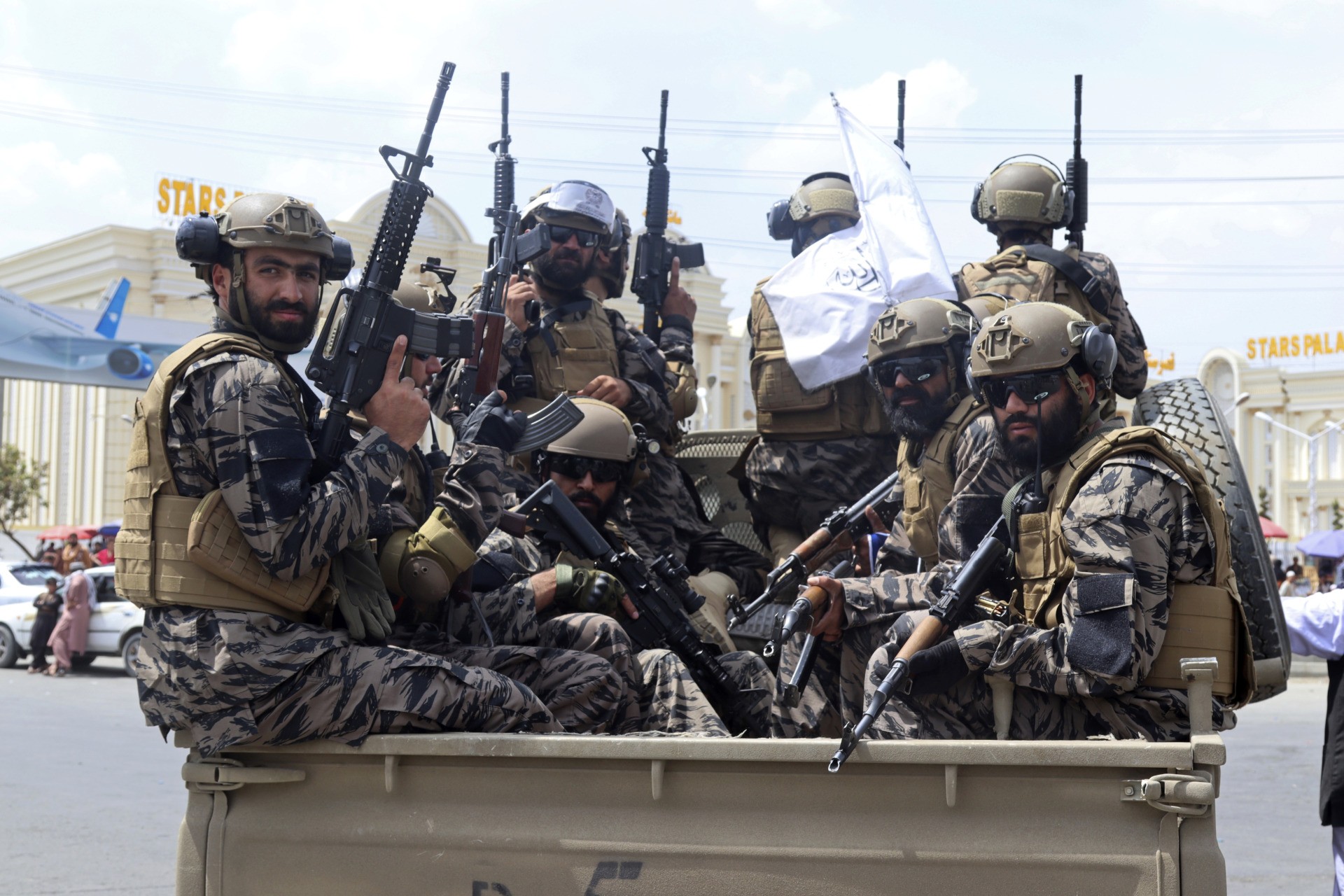
Taliban special force fighters arrive to the Hamid Karzai International Airport after the U.S. military’s withdrawal, in Kabul, Afghanistan, Tuesday, Aug. 31, 2021. (AP Photo/Khwaja Tawfiq Sediqi).
“The Taliban itself is a terrorist organization,” he said, “so they’re talking as if it isn’t.”
Describing a “new narrative” beginning over the Taliban, the retired British colonel lamented that some “have been talking as though we’re now the friends of the Taliban … and there’s discussion of opening diplomatic relations” with the Islamic terrorist group.
“The reason for this narrative — and it’s kind of a narrative that says that we and the Taliban are on the same side against the Islamic State, which is not true — is to deflect the blame for what’s happened and make it less catastrophic in people’s eyes,” he said.
“[They want us to believe] we haven’t been replaced in Afghanistan by a terror group, that we’ve been replaced by a responsible government — which isn’t the truth,” he added.
He also described President Biden’s claim that the Islamic State and Taliban are “sworn enemies” of one another as false.
“They’re not sworn enemies,” he said, “they have the same agenda.”
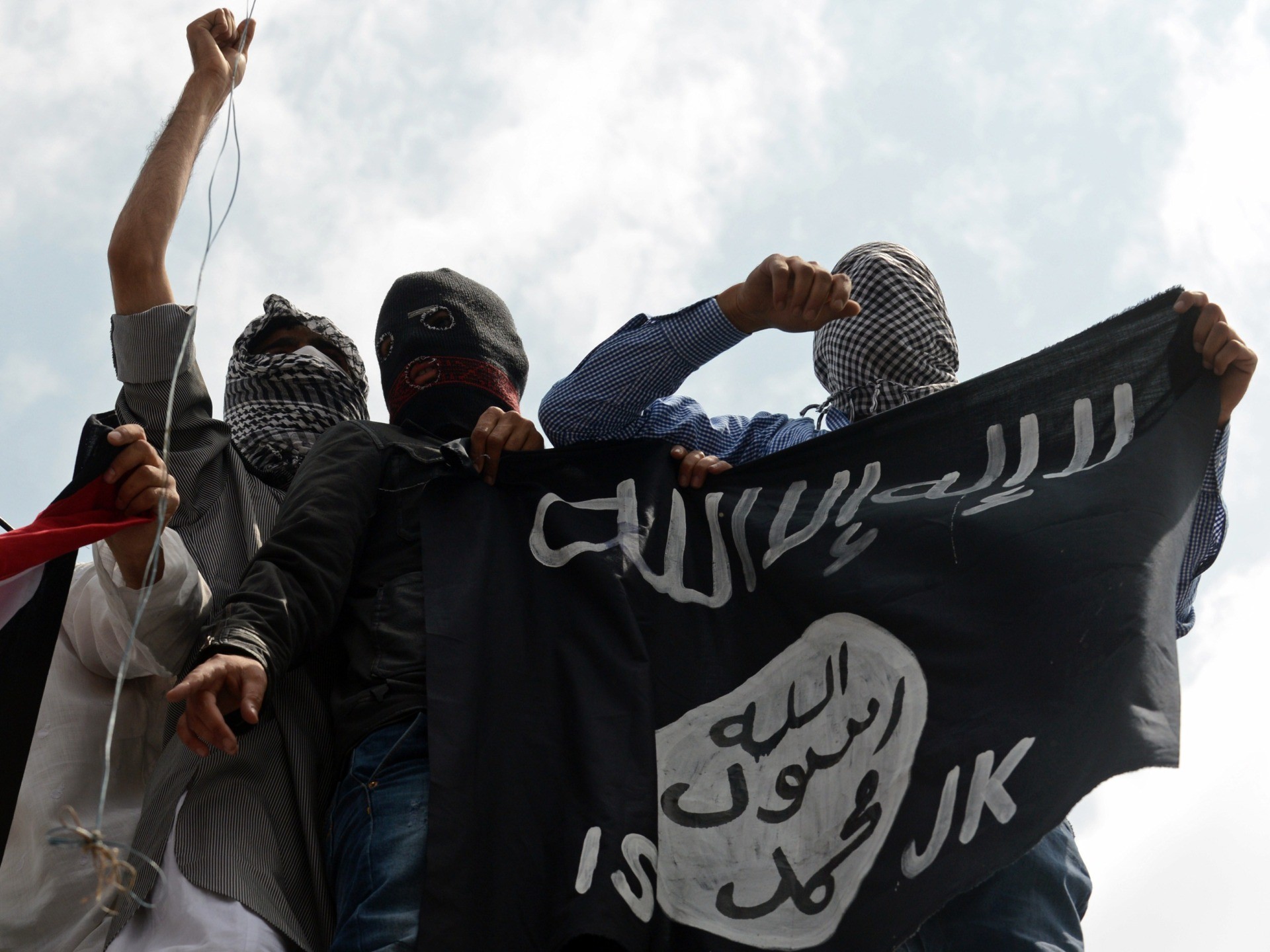
Kashmiri demonstrators hold up a flag of the Islamic State of Iraq and the Levant (ISIL) during a demonstration against Israeli military operations in Gaza. (TAUSEEF MUSTAFA/AFP via Getty Images).
“They have the same ideology and use the same methods, they just wear a different cap badge and the same is true of al-Qaeda,” he added.
Admitting that at times the two groups may “hate and kill each other,” Kemp noted that at other times “they cooperate.”
“That doesn’t mean to say that we are on the side of the Taliban against them — the opposite [is true],” he said.
Kemp also warned that the Taliban is now more dangerous and capable than ever.
“Before 9/11, before 2001, the Taliban was focused on Afghanistan [and] didn’t have external ambitions,” he said, “today that’s changed.”
“There are many young new people who’ve joined the Taliban who are focused externally,” he said.
Noting that the Taliban now presents a new threat having fought the West for 20 years with some having been incarcerated in the notorious Guantanamo Bay, Kemp warned that the group is now “more focused on international jihad rather than just on Afghanistan.”
He also stated that the Taliban and al-Qaeda have been fighting together in recent years and that “we will see them building up their presence in Afghanistan along with the Islamic State.”
Kemp then warned that jihadis would now “flock from around the world into Afghanistan to train, to plan, to prepare, and to carry out attacks against the West.”
“This is the greatest victory for jihadists,” he said, “certainly since the Islamic revolution in Iran in 1979 where that was the last time an Islamic terrorist state was created, this being the second time.”
Claiming the Taliban victory has likely “been celebrated around the world by jihadists,” Kemp expressed concern that it would “strengthen jihadists everywhere.”
“It will bring them in more funding and more recruits and will re-energize their efforts,” he said.
“In collective terms, the threat directly from Afghanistan — the threat from inspiration of jihadist groups from Afghanistan and their victory — has significantly increased the terrorist threat,” he added.
Noting that resistance to the Taliban forming in the Panjshir Valley under the Northern Alliance “doesn’t get talked about enough,” Kemp called to support the weakening of the Taliban through such groups.
“I think we should be doing all we can in the West to undermine the Taliban,” he said, “and that includes giving support to the Northern Alliance in the Panjshir Valley” which is building up a force.
“I don’t know whether they have any prospect of hitting at the Taliban in any effective way but if they do then we should be behind them in some way that may be covert support rather than overt support,” he continued.
“We should certainly be supporting them because they are, I think, the best hope for bringing down the Taliban and I believe the Taliban does need to be brought down,” he added.
Kemp also warned that, “We cannot afford to treat the Taliban as the legitimate government of Afghanistan” for it would be like “treating the Islamic State as the legitimate government representing [the] Syrian people.”
Nuclear threats
When asked about the potential threat of nuclear weapons falling into the hands of terrorists, especially with the Taliban and other terror groups operating near neighboring nuclear Pakistan, Kemp described it as “one of the greatest concerns of coalition leaders throughout the campaign in Afghanistan.”
“A victory for the Taliban in Afghanistan could inspire and encourage the insurgency that’s going on already in Pakistan and could well lead to nuclear weapons or nuclear material falling into the hands of jihadists,” he warned, adding that it is “the worst possible scenario after 9/11, and was the reason for the invasion of Iraq — not nuclear, but WMD [weapons of mass destruction].”
Recalling the “many years” spent working in government and intelligence in both the U.S. and U.K., Kemp reiterated that “the greatest concern was always the possibility of nuclear materials falling into the hands of jihadis.”
“The Taliban success and presence in Afghanistan now could possibly lead to greater instability in the region so that is probably the single greatest danger that we now face,” he added.
Iran
When asked about the effects of the U.S. pullout from Afghanistan on the Islamic Republic of Iran, Kemp claimed that “what’s happened in Afghanistan has certainly empowered Iran and will inspire Iran as well to greater aggression in the region that it’s had up to now, which is very significant anyway.”

An Iranian soldier sitting atop a T-72 tank as it rolls past a portrait of Iran’s supreme leader, Ali Khamenei. (BEHROUZ MEHRI/AFP via Getty Images).
“[Iran] will see the U.S. defeat in Afghanistan — when I say the U.S. I include Britain, etc. but particularly the U.S. because of the U.S. position — as being effectively a green light to do as it likes,” he said.
“It will see the weakness of America and believe that America is not going to intervene again in any significant way, and it will encourage Iran to be even more aggressive,” he added. “It will certainly encourage Iran to push ahead with its nuclear program which it intends to do anyway.”
Kemp also warned of the increased threat to Israel and other Middle East U.S. allies by an emboldened Iran.
“Israel and also other Sunni regional powers — the threat to them is far greater now, and they’ll be afraid of the threat from Iran without American support for them, without guaranteed American support for them, even more than they were before,” he said.
“They were already worried about that because we’ve seen Iran, we’ve seen America favor Iran, we’ve seen them trying to grant hegemony to Iran, to enable a nuclear project under the JCPOA [Iran deal] which paves the way for a nuclear weapon,” he continued.
“We’ve seen them abandon Saudi Arabia and in effect refuse to support Saudi Arabia’s proxy war in Yemen against Iran,” he added.
The current situation in Afghanistan will also give “added impetus to a nuclear arms race in the Middle East,” according to Kemp, but “will probably also give added impetus to the Abraham Accords [Peace Agreement] because the other Arab countries in the Middle East will now be looking increasingly to Israel as their protector believing they can’t rely on the U.S. anymore.”
“This was already underway but I think this has accelerated that process,” he continued, adding that Israel will “have to deal with a potential Iranian nuclear weapon” on its own.
Refugees
When asked about the threat of another potential refugee crisis in Europe as a result of the failed state in Afghanistan, Kemp claimed such a crisis was already at hand.
“We already have a refugee crisis now from Afghanistan,” he said.
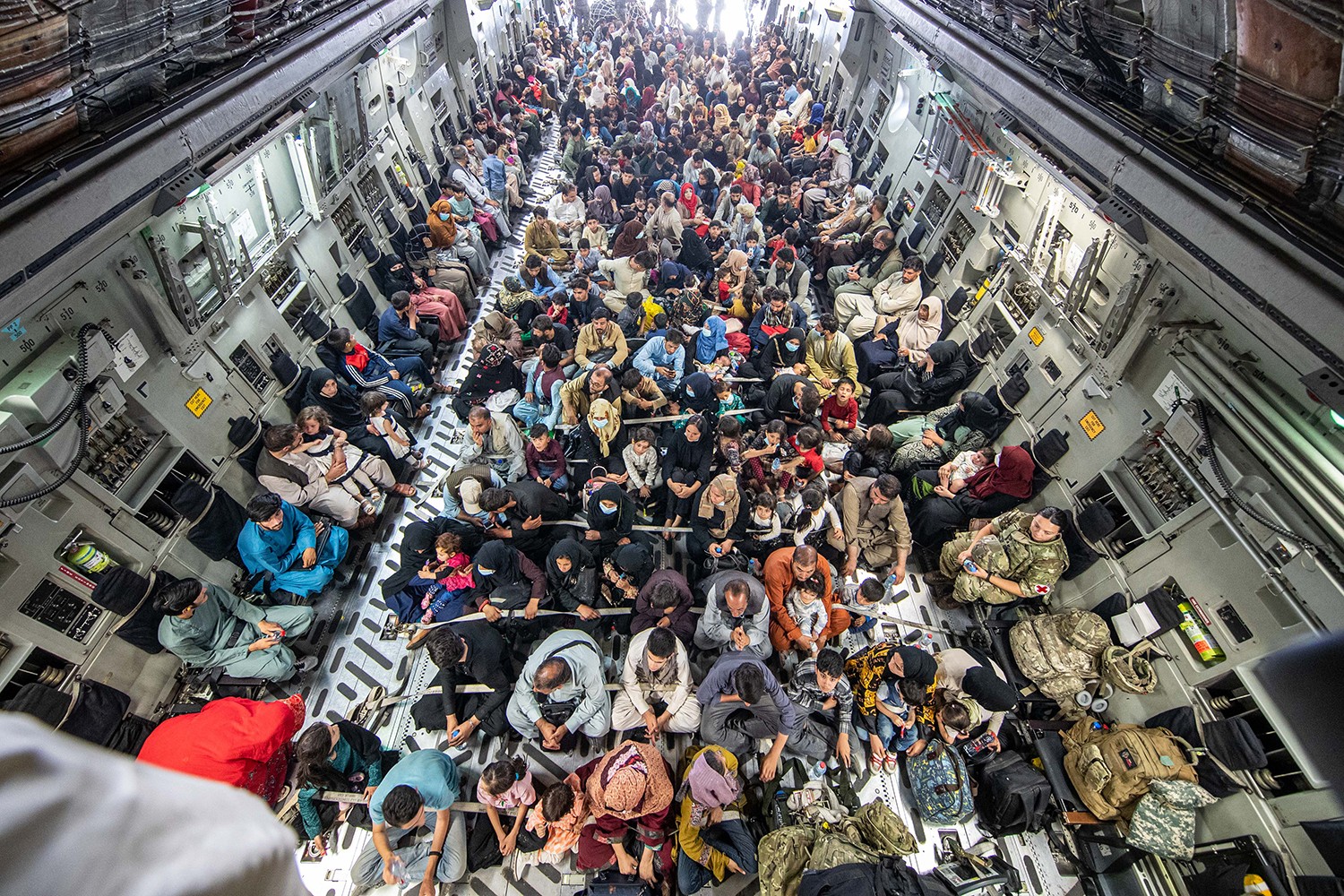
In this handout image provided by the Ministry of Defence, a full flight of 265 people are evacuated out of Kabul by the UK Armed Forces on August 21, 2021 in Kabul, Afghanistan. The British armed forces are evacuating UK citizens and eligible personnel out of the Afghan capital after the Taliban took control of the country last week. (Ben Shread/MoD Crown Copyright via Getty Images).
“Many, many have been leaving since the fall of the government became pretty obvious,” he added. “It goes back really to the last administration’s decision to pull out of Afghanistan.”
Warning of an increased refugee crisis in the region, Kemp claimed Europe is “already struggling with an overwhelming number of refugees and immigrants coming into Europe from Africa and the Middle East.”
“This will very much overburden Europe and create enormous pressures and friction and potential threats as well,” he said, “because among the refugees will be some jihadists.”
The Biden administration
When asked about the Biden administration depicting the chaotic withdrawal from Afghanistan as an “extraordinary success,” Kemp claimed that such was part of Biden’s strategy.
“Biden’s calculation all along has been that this withdrawal from Afghanistan will be an electoral advantage for him in midterms and again in the presidential elections,” he said. “That was always his calculation.”
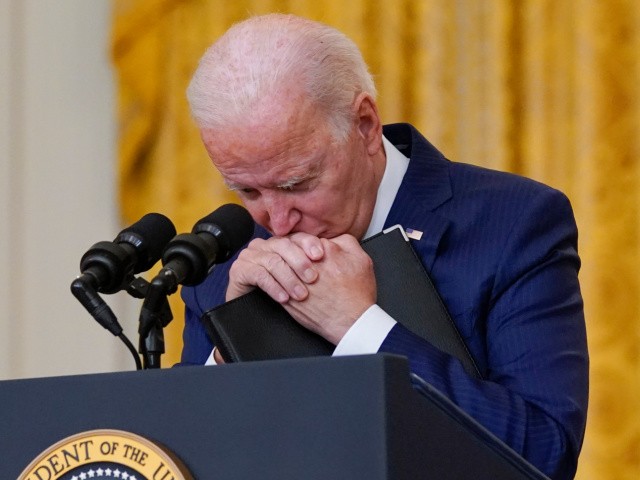
President Joe Biden pauses as he speaks about the bombings at the Kabul airport that killed at least 12 U.S. service members, from the East Room of the White House, Thursday, Aug. 26, 2021, in Washington. (AP Photo/Evan Vucci)
“Because he didn’t anticipate what happened, he didn’t expect it to be as bad as this, but I think his hope is that the American people — particularly if they’re told enough times that this was a success — will forget the humiliation and forget the disaster it’s been and simply be grateful to him for ending what he calls the ‘forever war,’” he continued.
Claiming the president’s “driving motivation” is the midterm and next presidential election, Kemp accused Biden of an inability to accept reality.
“Whatever the reality is, he can’t possibly accept it,” he said, “and it was in one of the papers today I think that [one of] the last conversation he had with the president of Afghanistan before he fled the country was that the optics have got to be altered to fit [President Biden’s] agenda.”
“That’s all he’s interested in and I think it’s deeply, deeply cynical,” he added.
Arguing that he does not believe the U.S. “has ever had a worse President than President Biden as a direct result of this action,” Kemp slammed the president for having “tried to blame everyone else” for recent events.
“He’s tried to particularly put the blame on [former President Donald] Trump,” he said. “Trump is not to blame for this.”
“Trump left office several months ago and this decision is solely on Biden’s shoulders,” he continued. “He’s tried to blame the Afghan national security forces and called them cowards.”
“Despite the fact he says ‘the buck stops with me,’ he clearly doesn’t think that because he’s blaming everyone that he can see,” he added. “So I think it’s a great humiliation for the U.S.”

No comments:
Post a Comment